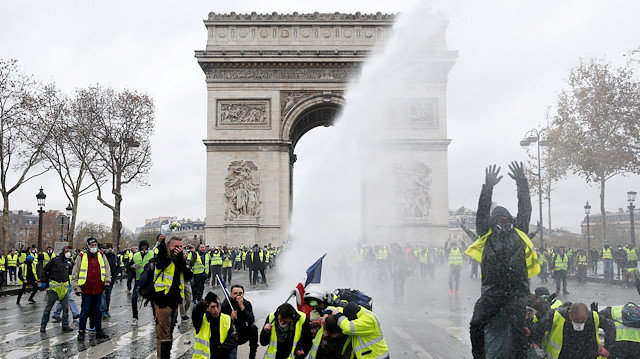
Macron said after the latest protests in Paris that he would convene ministers to discuss the crisis on his return from a G20 summit in Argentina. Prime Minister Edouard Philippe cancelled plans to go to Katowice for the climate change summit.
Macron introduced new carbon taxes to urge motorists to change behaviour and protect the environment.
Macron has watered down some of his campaign pledges on the environment since he took office, and his popular environment minister quit in August over the sluggishness of progress. But he has shown little willingness to compromise in the face of the protests.
The fuel tax is accompanied by other measures including incentives to encourage people to buy electric vehicles.
Unveiling a medium-term energy plan for France last week, he held out an olive branch by saying he would review fuel prices each quarter, but said the carbon taxes would stay.
His goal is for France to cut carbon emissions by 40 percent by 2030 and boost the use of cleaner energies at the same time. Emissions are currently rising and 75 percent of energy use in France originates from fossil fuels.
"When we talk about the actions of the nation in response to the challenges of climate change, we have to say that we have done little," he said.
Macron has also said he will fight to try to save the Paris climate agreement, which aims to keep global temperature rises to between 1.5 and 2 degrees Celsius, a critical threshold.
Scientists are increasingly concerned that countries are falling short on their targets and must be more ambitious. Yet citizens are worried about their immediate lives.
In Canada, addressing the question of how governments use the money raised from carbon taxes, Trudeau's government has promised to return the money collected from the provinces directly to taxpayers.
But in France most of the revenue generated will be used to tackle the national budget deficit, increasing anger at Macron, who left-wing opponents call the "president of the rich".
Of the 34 billion euros ($38.71 billion) the French government will raise on fuel taxes in 2018, a sum of only 7.2 billion euros is earmarked for environmental measures.
Simon Dalby, a specialist in the political economy of climate change at Wilfrid Laurier University in Canada, says carbon taxes should be part of wider measures to alter how people live, including better, greener transport and buildings.
"It is all about policies for transition to a post-fossil-fuel world, something that needs to be done quickly if the worst of the predicted climate disruptions are to be avoided in the coming decades," he said.
Gemenne said the protests in France were unlikely to go away soon, and may emerge in other countries as they take more determined action on emissions.
The danger, he said, was inaction, or acting too late to prevent global warming. At the same time, politicians need to be able to show they were acting fairly and equitably.

















